Jake Shears’ story is the stuff gay dreams are made of: small town boy moves to New York, transforming himself from sexy young scene queen to international rock star.
But how did Jason Sellards get from a boyhood spent between Mesa, Ariz., and San Juan Island, Wash., to dancing on the bars of East Village gay clubs and later touring the world with his band Scissor Sisters?
That’s the story Shears tells in his new memoir. Boys Keep Swinging (Simon and Schuster) is equal parts coming of age story and juicy tell-all, detailing Shears’s difficult formative years, his sexy exploits on New York’s Giuliani-era queer scene, right up through his band’s chaotic rise to success.
On a break from performing in Broadway’s Kinky Boots, the 39-year-old “born showman” chatted with Queerty about coming out in high school, the solo album he can’t wait for you to hear and how the thirst for attention that has been his life-long motivation.
How about we take this to the next level?
Our newsletter is like a refreshing cocktail (or mocktail) of LGBTQ+ entertainment and pop culture, served up with a side of eye-candy.
Why write a memoir now?
Well, the opportunity came up. Rakesh Satyal from Simon and Schuster contacted me and said, “Would you be interested in writing a memoir that’s focused around New York during the millennium?” I didn’t really take it totally seriously, but then I hung out with him and we got on really well. I’m a huge book person. I’m a massive reader and I love writing. Growing up I always thought I was gonna be a fiction writer. The opportunity to write a book with that kind of support, that’s not anything that I would shy away from. And I liked the fact that the book ends when it does. It gave me enough distance from it. If it was a memoir of my entire career with the band I don’t think I would have done it.
How did you decide what Boys Keep Swinging would cover?
I think there’s an arch in the book of me growing up, having quite the time as a teenager, finding myself, getting to New York and finding that freedom I’d been searching for and starting to be creative, and suddenly having life kinda getting out of control. I kinda fall apart. I turn into a monster a little bit and my wheels start coming off by the end of this book.
As far as why the book ends where it does, I felt like that moment was the end of a chapter. I put myself back together again and was a changed person after that. Things were never the same after that. A lot of things were coming to a close and a lot of new things were happening.
You begin the book by saying that you were a “born showman.” How did you express that when you were young?
I just needed attention. I needed attention constantly and that didn’t stop. That went through my young adult years into when I moved to New York. As time went on I found a great outlet for that. And it became a positive thing in my life, I think, rather than something that ever became destructive—and I think the possibility was there for that.
Yeah, you mention your need for attention a few times throughout the book. Do you have a sense of where that need comes from?
It’s always been there. I don’t quite have an answer for that. Maybe that was one of the frustrating things about [writing the book]. I found some answers for certain things and then I didn’t find answers for others. That thing in me is just a personality trait that I think has been in me since I was a small child.
Do you think it’s connected in any way to growing up gay—being perceived as different before you even have a sense of how or what that means?
I think there probably is a connection, but I think it can go either way. I think that feeling of being different, that can close people off and make people hide and just be as small as they possibly can. I wanted my personality to be as big as it possibly could, even as a six-year-old.
You came out in high school, but the way you write about it, it seems like you came to regret that decision. Why?
Now I don’t [regret it], but if I were to do it again, I would have done it differently. I really wanted to feel the freedom that I saw other kids feeling. And I was so resentful that I had to go through all this shit just to find a cute boy to date. All these other kids in high school, it’s like, You all get to have these normal lives, and I’ve got to have all this baggage attached. I was angry about that. I think at the time, it was just not the safest scenario for me.
I’ll have teenagers contact me [now] saying, “I really want to come out,” or asking me for advice. My advice is usually to hold on for a second and look at your situation. Look at your support system around you. Are your parents going to throw you out? Don’t put yourself in any sort of danger, because it’s not worth it. I think for certain kids, sometimes it’s better to wait. And I think for me, I put myself in a scary position.
You recently spoke about a relationship you had when you were 16 with an older man. You write about it in the book, and I’m assuming that was written a while ago. So I was wondering if you look back on that relationship differently post #MeToo, now that the allegations against Kevin Spacey are part of that conversation.
Yeah, I think it’s made me look at it differently. It’s hard because I think there’s always something in you—you can downplay certain things, even to yourself, your whole life, and underestimate how things affect you. But, I mean, do I wish it hadn’t happened? Yeah! [Laughs] I don’t know what else to say about it, really.
Related: Jake Shears: If all you’re giving the world is your body on Instagram, check yourself, f*ck off
If this is too personal, by all means, tell me, but what lasting affects do you think that relationship had on you?
I think I was hurt by it. It was more about feelings than anything else. I had basically a crush on this older guy that, you know, sort of allowed that crush to happen. I think it was confusing at that age and it hurt. That’s the extent of it. And thank god for Dan Savage, a grown man, who was 32-years-old when we met, telling me that this was fucked up. Dan was really integral to my teenage life.
So you mentioned that the book largely focuses on your early years in New York in the early 2000s. But it’s been a while since you have actually lived in New York, right?
I’m just here doing Kinky Boots now, but I’ve lived in LA for five years, and I’ve split my time between LA and New Orleans for the last couple years.
Did that distance from New York help you write about it? Maybe see it more clearly?
I think so. And also, I kept so many journals from that time. Even if they’re not incredibly consistent, they were consistently inconsistent. So I definitely had plenty of my own writing during that whole time that I could go back to and at least have little tent poles that I could flesh stuff out from and get chronological stuff right. But I think having a bit of distance from New York, from all of it, helped. There’s a whole other book in me after this. This book ends in 2006. I’ve still got a whole other book in me, but I definitely think I’ll have to wait a few years to write it.
For those who didn’t live through it, what do you want to convey about Giuliani-era New York?
I just hope that it puts across some kind of snapshot. It’s a tiny, tiny little slice of my experience and I probably could have written a couple hundred more pages. It’s really crazy how much you have to leave out. It drove me nuts. So I think it provides a snapshot of that time, of who I was and what I was thinking and what I was doing and hopefully can be an inspiring story to people. I don’t necessarily think I have a bunch of answers. You get to the end of the book and, like, I don’t know what the fuck it all means. I realized a few things, but I really just wanted it to be an honest snapshot from my perspective.
You describe going out alone to bars and clubs, and feeling insecure. You say that you would watch “men who were bigger and hotter” than you, and you describe them as “everything you wanted and didn’t want to be.” What do you mean by that?
I think that’s something that a lot of gay men experience, that internal struggle with their bodies. This passage you’re talking about, I’m looking at these guys like, Yeah, I would love to be big and hot! But then hating myself for feeling that way. And that’s something so many gay guys struggle with. That’s something that I still struggle with. It’s one of the stories of my 30s.
Obviously, you write a lot about your experience go-go dancing, going out, partying. A lot of people, a lot of gay guys go to New York with creative ambitions and get sucked into nightlife, the club scene. It can be a creative environment, but it can also be a destructive one. Do you have a sense of why you succeeded where others didn’t in using it as a launching pad?
That’s a tough question. I mean, I always just had a strong mix of ambition and play. And to me play is very important as far as being creative and making good work. I don’t know, I’ve been lucky in the fact that whenever there’s been a danger of losing myself to the night, I’ve always had some kind of a tripwire where I’ve been able to look at my priorities. The mix is so important to me, I would hate to get to a point where that was ruined. God, I’ve lost amazing friends to drugs and it’s just so sad. So, you can see in the book, there’s definitely a light and a dark.
Related: Jake Shears opens up about dating a man twice his age when he was still in high school
Ok, so skipping ahead to touring with Scissor Sisters: You write very honestly about the sense of exhaustion and malaise that set in fairly soon after the band became successful. I was surprised how quickly is seems like it stopped being fun.
It didn’t completely stop being fun. The payoff was getting out on stage and that made it worth it. Also, we were new. We didn’t know what we were doing. Our management didn’t know what it meant to overbook us. We didn’t know how easy it could be to accidentally have 60 days with no day off! It’s a learning curve. Once that train starts rollin’ you kinda don’t realize how easy it can be to be totally consumed—to have bitten off more than you can chew.
But I found being on stage and getting the opportunity to learn how to perform—that was very satisfying. As dark as it got, I wouldn’t trade it in for anything.
What’s the status of your solo album?
It’s ready to go.
What can you tell me about that album?
I’ve poured so much into it and I’m immensely proud of it. It’ll feel very familiar. In a good way. However, it was recorded in a very different way from anything else I’ve made. It’s a very intricate and complex record, and it’s so much fun. It’s kinda the most personal thing I’ve ever written. I didn’t have to go through the filter of the band. I didn’t have to worry about that with this. I have a really good feeling about it. There’s some introspective stuff, but it’s a happy record. There’s a lot of joy in it. I think we could use some happy music right now.
I wanna put some joy out in the world.
Related: New Orleans is about to be overrun by Jake Shears and other sexy book nerds


















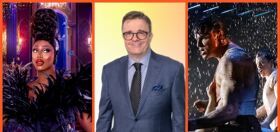


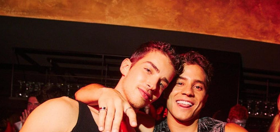
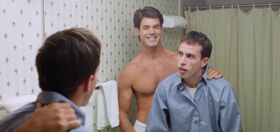
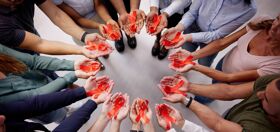

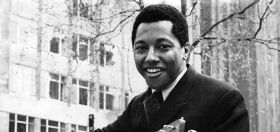
Josh447
Always hated that name scissor sisters.
Ummmm Yeah
Did he say whether the band is broken up or not? That’s a question they have all avoided since they went on hiatus.
seaguy
My mom met him I think cause she has friends in the San Juan islands. Had I known I would have said mom fix me up.